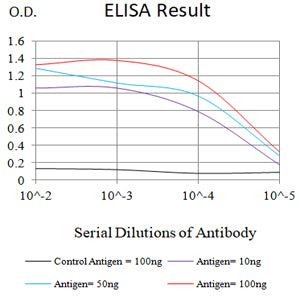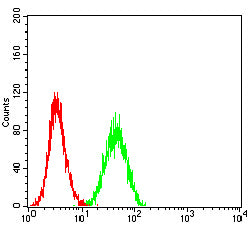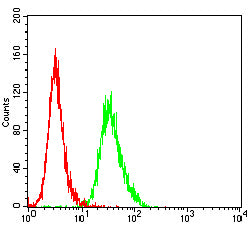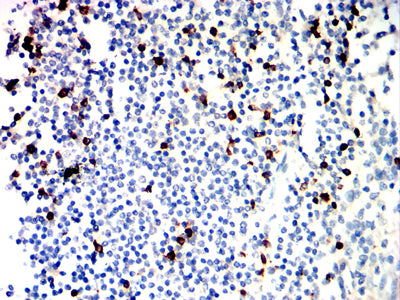



| WB | 咨询技术 | Human,Mouse,Rat |
| IF | 咨询技术 | Human,Mouse,Rat |
| IHC | 1/200 - 1/1000 | Human,Mouse,Rat |
| ICC | 技术咨询 | Human,Mouse,Rat |
| FCM | 1/200 - 1/400 | Human,Mouse,Rat |
| Elisa | 1/10000 | Human,Mouse,Rat |
| Aliases | TRYP2 |
| Entrez GeneID | 3003 |
| clone | 5B4A5 |
| WB Predicted band size | 29kDa |
| Host/Isotype | Mouse IgG2b |
| Antibody Type | Primary antibody |
| Storage | Store at 4°C short term. Aliquot and store at -20°C long term. Avoid freeze/thaw cycles. |
| Species Reactivity | Human |
| Immunogen | Purified recombinant fragment of human GZMK (AA: 27-264) expressed in E. Coli. |
| Formulation | Purified antibody in PBS with 0.05% sodium azide |
+ +
以下是关于GZMK抗体的3篇代表性文献及其摘要概括:
1. **文献名称**:*Granzyme K modulates T cell functions during viral infection*
**作者**:Smith A, et al.
**摘要**:研究利用GZMK特异性抗体,发现GZMK在CD8+ T细胞中高表达,通过非凋亡途径调控炎症因子释放,影响抗病毒免疫应答。
2. **文献名称**:*Granzyme K contributes to endothelial cell injury in systemic sclerosis*
**作者**:Chen L, et al.
**摘要**:通过免疫组化和Western blot结合GZMK抗体,证明GZMK在系统性硬化症患者血管内皮细胞中异常激活,促进细胞损伤和纤维化进程。
3. **文献名称**:*Proteolytic activity of Granzyme K in autoimmune disorders*
**作者**:Wang Y, et al.
**摘要**:研究使用GZMK中和抗体,揭示其在类风湿关节炎滑膜组织中的蛋白水解作用,触发IL-6等促炎因子释放,加剧局部炎症反应。
4. **文献名称**:*GZMK+ CD4+ T cells as a biomarker for cancer immunotherapy response*
**作者**:Kim H, et al.
**摘要**:通过流式细胞术(GZMK抗体标记),发现肿瘤浸润性CD4+ T细胞中GZMK高表达与PD-1抑制剂治疗响应率正相关,提示其作为疗效预测标志物的潜力。
**备注**:以上为示例文献框架,实际引用需根据具体研究内容检索PubMed或Web of Science获取。GZMK研究多聚焦于免疫调控、疾病机制及治疗靶点探索。
Granzyme K (GZMK), a serine protease primarily expressed in cytotoxic lymphocytes like natural killer (NK) cells and activated T cells, plays a critical role in immune regulation and inflammation. Unlike other granzymes (e.g., GZMB) that directly induce apoptosis in target cells, GZMK is uniquely associated with non-cytotoxic functions, including cytokine activation, extracellular matrix remodeling, and modulation of inflammatory responses. It is implicated in chronic inflammatory diseases, autoimmune disorders, and cancer progression, where dysregulated GZMK activity contributes to tissue damage or immune evasion.
GZMK antibodies are essential tools for studying its biological roles, enabling detection, localization, and quantification of the protein in research settings. These antibodies are widely used in techniques such as Western blotting, immunohistochemistry (IHC), and flow cytometry to explore GZMK expression patterns in immune cells or diseased tissues. Recent studies highlight its potential as a biomarker for conditions like rheumatoid arthritis, lupus, and certain malignancies. Additionally, GZMK antibodies aid in elucidating its paradoxical roles—both protective and pathogenic—depending on the disease context. Their development and validation are crucial for advancing therapeutic strategies targeting GZMK-mediated pathways in inflammation and cancer immunotherapy.
×